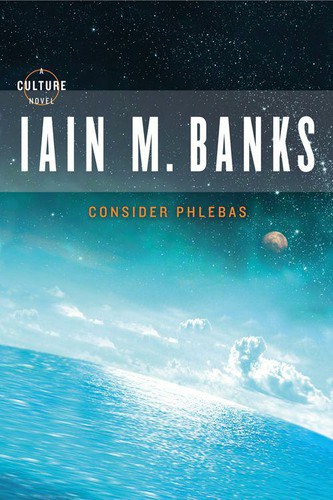Review: Consider Phlebas [★★★★☆]
Consider Phlebas
by Iain M. Banks
My rating: ★★★★☆
Read From: 1 April 2014 - 7 April 2014
Goal: Series
I might have had a better idea of what to expect from this story, had I first been familiar with T. S. Eliot's poem "The Wasteland".
Phlebas the Phoenician, a fortnight dead,
Forgot the cry of gulls, and the deep seas swell
And the profit and loss.
A current under sea
Picked his bones in whispers. As he rose and fell
He passed the stages of his age and youth
Entering the whirlpool.
Gentile or Jew
O you who turn the wheel and look to windward,
Consider Phlebas, who was once handsome and tall as you.
This is a story of Bora Horza Gobuchul's last adventure. His story opens with his intended execution: tied up to drown in an enemy sewer, watching the waste rise around him, waiting for it to rise high enough to smother and suffocate. He survives that experience but things never really do get better from there.
The Culture is a society of anarchists. Indeed, it is more of an idea than an identifiable thing, with defined boundaries.
In practice as well as theory the Culture was beyond considerations of wealth or empire. The very concept of money — regarded by the Culture as a crude, over-complicated and inefficient form of rationing — was irrelevant within the society itself, where the capacity of its means of production ubiquitously and comprehensively exceeded every reasonable (and in some cases, perhaps, unreasonable) demand its not unimaginative citizens could make. These demands were satisfied, with one exception, from within the Culture itself. Living space was provided in abundance, chiefly on matter-cheap Orbitals; raw material existed in virtually inexhaustible quantities both between the stars and within stellar systems; and energy was, if anything, even more generally available, through fusion, annihilation, the Grid itself, or from stars (taken either indirectly, as radiation absorbed in space, or directly, tapped at the stellar core). Thus the Culture had no need to colonise, exploit or enslave.
The Culture was at war with the Idirans. The Idirans had been expanding through the galaxy on a religiously motivated quest to bring order to lesser species. The Culture was not involved in a war of defense. Indeed, the Idirans were explicitly not threatening the Culture. Culture declared war on moral grounds—that of protecting lesser species and peoples from outside aggression. The Culture declared war on the Idirans because they wanted to feel useful, to justify their otherwise hedonistic lifestyle.
The Culture consists of both humans and Minds. Minds are immensely sophisticated and powerful artificial intelligences, usually installed as the brain's of ships. On the fringes of the war, a new Mind was built and installed mere moments before an Idiran attack. The Mind fled and soon came under attack itself. In desperation, it left its exploding ship and used hyperspace to jump directly into the core of Schar's World.
It was good place to hide. Schar's World was a devastated planet that had been preserved by the Dra'Azon as a Planet of the Dead, a monument to futility. The Dra'Azon established a neutral boundary around each Planet of the Dead—almost no one is allowed in and no battles can take place inside of that boundary or on the planet itself. This then is the standoff: the fugitive Mind, hidden inside the core of Schar's World; the Idirans and Culture, both desiring to recover the Mind, unable to directly approach the planet or land on it.
Horza, although descended from Humans, fights for the Idirans. This is his story. How, on behalf of the Idirans, he made his way to Schar's World, to hunt for the Mind. This is the story of why he fights for the Idirans and why he despises the Culture. This is also the story of his complicated relationship with Perosteck Balveda, the Culture agent assigned to rescue the Mind. Horza and Balveda are on opposites sides but Horza seems to have more in common with—and sympathy for—Balveda than he does his own allies.
I've been ruminating lately on what literary fiction is. As a result, I can definitely say that this is not literary fiction. But it's a lot further towards that side of the continuum than most of the stories I read. Horza's motivations and beliefs are central to this story.
He hates the Culture and, as the story unfolds, we are given enough glimpses of the Culture to begin to understand why. They are decadent, undisciplined, and depraved. This is, perhaps, seen most clearly in the Damage game that Horza watches. By the end of the book, it's not hard to see why Horza would rather live with the Idirans than with the Culture.
There's action in this book, lots of it. There's the laser firefight in a crystal temple. There's a slowly crashing multi-kilometer luxury liner. And then there's the scene where Horza pilots a mercenary ship as it escapes from the inside of a docking bay that is itself just one of many that are inside of a truly massive transport ship. Even here, the focus is less on the action itself and more on Horza's reactions to it, as it's happening.
All of the above is just a windy way to say: this is a higher quality story than most I normally read or than most authors write. As a fan of the genre, it's definitely worth reading.
This entry was tagged. Book Review Review
